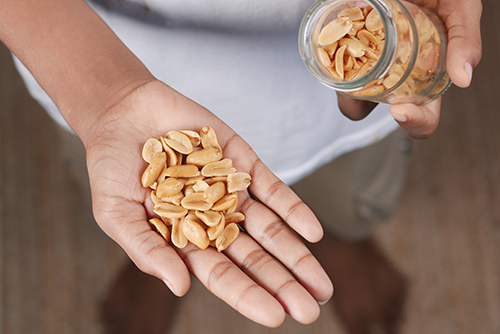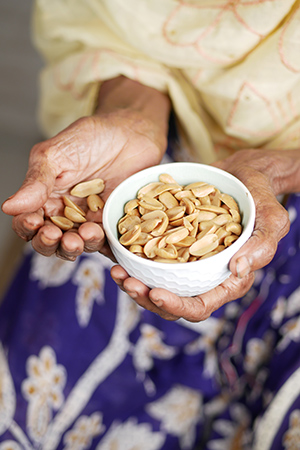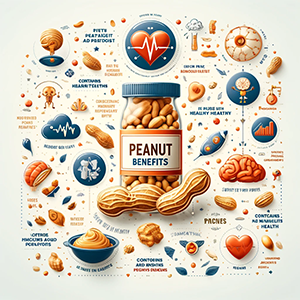Contents
Peanuts are one of the most popular healthy snacks for obtaining protein, healthy fat, and fiber. They’re cheap, accessible, and easy to eat, and of course, they taste great!

There are many ways you can enjoy the benefits peanuts provide. You can eat them straight from the pack or sprinkle them on almost any dish to improve the flavor and texture. You can also use peanut butter and peanut oil, and peanut flour is considered a healthy gluten-free substitute for wheat flour.
Peanuts are complete with nutritional value. They are rich in fat, protein, and other vitamins and minerals. We have cataloged below some of the benefits of eating a few peanuts. Remember, moderation is essential! Eating a whole bag is not healthy; that’s over-indulging. You will now see why peanuts are more than a delicious addition to your diet.
Excellent For The Heart
One common misconception is that peanuts are bad for cholesterol levels because they are high in fat. While it is true that peanuts have a high concentration of fat, peanuts contain monosaturated fat that helps lower LDL (the so-called ‘bad’) cholesterol level. The fat content is similar to the composition of olive oil – unsaturated, healthy fat.
Monosaturated fats can help clear arteries and improve blood circulation, lowering the risk of stroke, heart attack, and other severe cardiovascular health problems.
Stimulates Weight Loss

Tree nuts, like almonds and walnuts, are popular among the weight-conscious. Peanuts can be added to the list as they benefit those wanting to slim down. Peanuts are full of fiber, which helps the digestive system. They contain protein and fiber, which keeps you full for longer, so you eat less.
Again, make sure you eat in moderation. Eating in moderation can help you feel satiated for an extended period but can make you gain weight if you eat too often. The best trick is not to keep eating until they are all gone but to pause for a few minutes after you have had some. This will trigger your satiety hormone, leptin, to let your brain know you are no longer hungry.
Incredible Source of Vitamins and Minerals
Aside from being a protein and healthy fat source, peanuts also contain various vitamins and minerals that benefit your health. Peanuts are a good source of vitamin E, which helps promote heart health. Eating healthy servings of peanuts can also help with nervous system functions and muscle repair, as they contain thiamine. Peanuts also contain magnesium, folate, niacin, copper, and biotin.
Helps Keep The Brain in Optimal Health
Peanuts are also known for their brain-boosting properties. Many people view peanuts as a ‘brain food,’ and they have good reason to believe that. Peanuts contain resveratrol, an antioxidant that helps blood circulation and is beneficial for the brain.

Resveratrol boosts cognitive abilities and improves short-term memory. It helps the brain process new information more quickly. Resveratrol also helps fight cognitive decline, lowering the risk of Alzheimer’s disease.
Health Considerations When Eating Peanuts
In addition to Alzheimer’s, diabetes, and cardiovascular disease, peanuts can help reduce the incidence and severity of colon health problems and prevent gallstones due to their cholesterol-lowering properties.
Eating dry roasted peanuts with the skin on them is the healthiest way to consume them. Don’t think that the sweetened versions of peanuts provide the same benefits. Those sweetened packs can spike your sugar levels.
The same applies to salted peanuts. If you are a salt lover, don’t eat copious amounts of peanuts to get your salt hit. Make sure your sodium intake doesn’t exceed healthy levels.
In summary, you can’t eat a whole bag every day, but you can eat approximately forty grams, which equals about sixteen peanuts daily. That’s only a tiny handful, but they have significant health benefits.
DISCLAIMER: All content on this website is presented solely for educational and informational objectives. Do not rely on the information provided as a replacement for advice, diagnosis, or treatment from a qualified medical expert. If you are pregnant, nursing, or have any preexisting medical concerns, talk to your doctor before using any herbal or natural medicines.
References
- Musa-Veloso K, Paulionis L, Poon TH, Lee H, Ros E. The Effect of Peanut Consumption on Cardiovascular Disease Risk Factors: A Systematic Review and Meta-Analysis of Randomized Controlled Trials. Foods. 2023; 12(5):946. https://doi.org/10.3390/foods12050946
- Liu X, Li Y, Guasch-Ferré M, Hu FB, Willett WC, Sun Q. Peanut Consumption and Risk of Cardiovascular Disease: A Dose-Response Meta-Analysis of Prospective Cohort Studies. Food Sci Hum Wellness. 2020 Jun;9(2):124-132. doi: 10.1016/j.fshw.2020.03.007. PMID: 32313362; PMCID: PMC7167917.
- Tan SY, Dhillon J, Mattes RD. A Review of the Effects of Peanuts and Peanut Butter on Appetite and Obesity. Nutrients. 2018 Jan 25;10(2):150. doi: 10.3390/nu10020150. PMID: 29385638; PMCID: PMC5852934.
- Kennedy DO. B Vitamins and the Brain: Mechanisms, Dose and Efficacy–A Review. Nutrients. 2016 Feb 3;8(2):68. doi: 10.3390/nu8020068. PMID: 26828517; PMCID: PMC4772032.
- Pandey KB, Rizvi SI. Plant polyphenols as dietary antioxidants in human health and disease. Oxid Med Cell Longev. 2009 Nov-Dec;2(5):270-278. doi: 10.4161/oxim.2.5.9498. Epub 2009 Nov 19. PMID: 20357818; PMCID: PMC2835915.
- Zhang J, Huang T, Cai X, Liu S, Zhang Y, Wan X. Anti-inflammatory effects of peanut (Arachis hypogaea L.) seed coat extract and its bioactive compounds. J Funct Foods. 2019 Apr;55:246-254. doi: 10.1016/j.jff.2019.02.025. Epub 2019 Feb 20. PMID: 30884924.
- Tsai CJ, Leitzmann MF, Hu FB, Willett WC. Frequent nut consumption and decreased risk of cholecystectomy in women. Am J Clin Nutr. 2004 Jul;80(1):76-81. doi: 10.1093/ajcn/80.1.76. PMID: 15213050.
- Yu J, Ahmedna M, Goktepe I. Effects of processing methods and extraction solvents on concentration and antioxidant activity of peanut skin phenolics. Food Chem. 2005 Oct 1;92(3):555-66. doi: 10.1016/j.foodchem.2004.08.008. PMID: 15955689.
- Kris-Etherton PM, Petersen KS, Satija A, Rudolph JL, Goldberg AC, Skulas-Ray AC, Fleming JA. Strategies to Lower LDL Cholesterol: The Evidence Base for Nonstatin Therapies. J Am Coll Cardiol. 2018 Oct 23;72(17):1993-2022. doi: 10.1016/j.jacc.2018.08.1040. PMID: 30355239; PMCID: PMC6187127.
- Castiglioni S, Cazzaniga A, Albisetti A, Maier JA. Magnesium and Osteoporosis: Current State of Knowledge and Future Research Directions. Nutrients. 2013 Aug 27;5(9):3022-33. doi: 10.3390/nu5093022. PMID: 23985882; PMCID: PMC3775240.
- Alasalvar C, Shahidi F, Cadwallader KR, Amarowicz R. Comparison of natural and roasted Turkish tombul hazelnut (Corylus avellana L.) volatiles and flavor by DHA/GC/MS and descriptive sensory analysis. J Agric Food Chem. 2003 Aug 27;51(18):5067-72. doi: 10.1021/jf030203d. PMID: 12926871.
